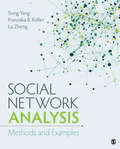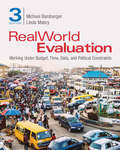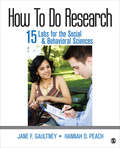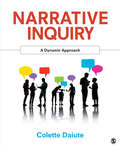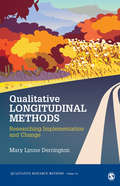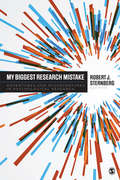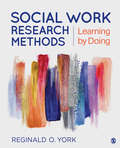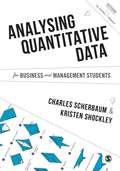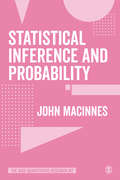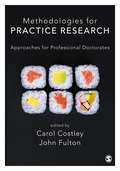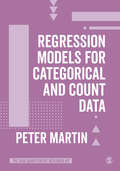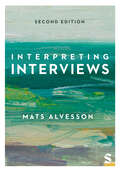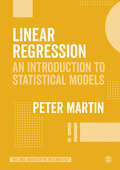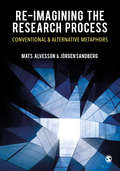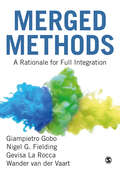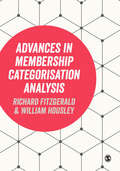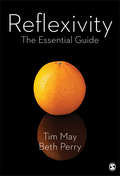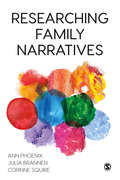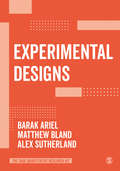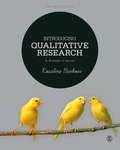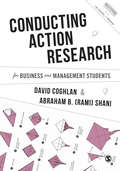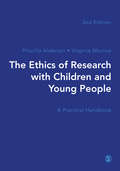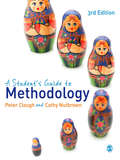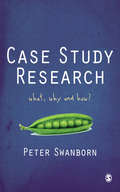- Table View
- List View
Social Network Analysis: Methods and Examples (Quantitative Applications In The Social Sciences Ser. #154)
by Lu Zheng Song Yang Franziska B KellerSocial Network Analysis: Methods and Examples prepares social science students to conduct their own social network analysis (SNA) by covering basic methodological tools along with illustrative examples from various fields. This innovative book takes a conceptual rather than a mathematical approach as it discusses the connection between what SNA methods have to offer and how those methods are used in research design, data collection, and analysis. Four substantive applications chapters provide examples from politics, work and organizations, mental and physical health, and crime and terrorism studies.
RealWorld Evaluation: Working Under Budget, Time, Data, and Political Constraints
by Linda S. Mabry J. Michael BambergerRealWorld Evaluation: Working Under Budget, Time, Data, and Political Constraints addresses the challenges of conducting program evaluations in real-world contexts where evaluators and their clients face budget and time constraints. The book is organized around the authors’ seven-step model that has been tested in workshops and practice environments to help the evaluation implementers and managers make the best choices when faced with real world constraints. The Third Edition includes a new chapter on gender equality and women’s empowerment and discussion of digital technology and data science.
How To Do Research: 15 Labs for the Social & Behavioral Sciences
by Jane F. Gaultney Hannah D. PeachDesigned to help students make the leap from learning about research to doing research, this manual provides an easy-to-understand walkthrough of the entire research process, from selecting a topic and conducting a literature review through presenting an APA-style paper or presentation. All of the 15 cross-disciplinary labs included are appropriate for use in the social, behavioral, and health sciences, and follow a consistent format: objective, description of a journal article, canned data, examples of what output should look like, pointers on interpreting the output, and a suggested activity for those who wish to collect their own data.
Narrative Inquiry: A Dynamic Approach
by Colette DaiuteNarrative Inquiry provides both a new theoretical orientation and a set of practical techniques that students and experienced researchers can use to conduct narrative research. Explaining the principles of what she terms "dynamic narrating," author Colette Daiute provides an approach to narrative inquiry that builds on practices of daily life where we use storytelling to connect with other people, deal with social structures, make sense of surrounding events, and craft our own way of fitting in with various contexts. Throughout the book, Daiute illustrates and applies narrative inquiry with a wide variety of examples, practical activities, charts, suggestions for interpreting analyses, and tips on writing up results. Narrative Inquiry integrates cultural-historical activity, discourse theories (including critical discourse theory and conversation analysis), and interdisciplinary research on narrative as applied to a range of research projects in different cultural settings.
Qualitative Longitudinal Methods: Researching Implementation and Change (Qualitative Research Methods #54)
by Mary L. DerringtonMary Lynne Derrington’s Qualitative Longitudinal Methods: Researching Implementation and Change addresses the use of the qualitative longitudinal methods, their unique methodological features, and the challenges and benefits to this approach. This short supplemental text uses examples of published studies, and the author’s own stories and examples, to show application of the concepts. A chapter on how to prepare a manuscript for publication concentrates on the distinctive aspects of publishing longitudinal studies. The book will be useful to those researching change and its impact on organizations and individuals resulting from the implementation of programs and policies.
My Biggest Research Mistake: Adventures and Misadventures in Psychological Research
by Robert J. SternbergMy Biggest Research Mistake helps students and professionals in the field of psychological science learn from the diverse mistakes of successful psychological scientists. Through 57 personal stories drawn from the experiences of fellows in the Association for Psychological Science (APS), editor Robert J. Sternberg presents the mistakes of experts in the field as opportunities for learning, allowing students to avoid making the same mistakes in their own work.
Social Work Research Methods: Learning by Doing
by Reginald O. YorkSocial Work Research Methods is a step-by-step journey through the process of conducting research. With over 30 years of teaching experience, author Reginald O. York helps readers discover how research can enable them to better serve clients in the field. Each chapter features a hands-on approach to producing research, with practical chapter exercises that reinforce methods mastery. Using their own data, students engage in realistic research activities and gain an appreciation for science-informed practice as a means of evaluating client outcomes.
Analysing Quantitative Data for Business and Management Students (Mastering Business Research Methods)
by Kristen M. Shockley Charles A ScherbaumIn Analysing Quantitative Data, Charles A. Scherbaum and Kristen M. Shockley guide the reader through Understanding Quantitative Data Analysis, Basic Components of Quantitative Data Analysis, Conducting Quantitative Data Analysis, Examples of Quantitative Data Analysis and Conclusions. An appendix contains Excel Formulas. Ideal for Business and Management students reading for a Master’s degree, each book in the series may also serve as reference books for doctoral students and faculty members interested in the method. Part of SAGE’s Mastering Business Research Methods Series, conceived and edited by Bill Lee, Mark N. K. Saunders and Vadake K. Narayanan and designed to support researchers by providing in-depth and practical guidance on using a chosen method of data collection or analysis.
Statistical Inference and Probability (The SAGE Quantitative Research Kit)
by John MacInnesAn experienced author in the field of data analytics and statistics, John Macinnes has produced a straight-forward text that breaks down the complex topic of inferential statistics with accessible language and detailed examples. It covers a range of topics, including: · Probability and Sampling distributions · Inference and regression · Power, effect size and inverse probability Part of The SAGE Quantitative Research Kit, this book will give you the know-how and confidence needed to succeed on your quantitative research journey.
Methodologies for Practice Research: Approaches for Professional Doctorates
by John Fulton Carol CostleyOrder your digital inspection copy here. Sharp and focused, this book provides the need-to-know information on how to design and implement a good, high quality research project. Oriented around real-world application, it emphasizes the aspects of research most relevant to conducting practice-based research. Assuming no prior knowledge, but appropriate for experienced learners, it builds knowledge at a sustainable pace. It offers readers: - A no frills guide to methodology and the theory of conducting research - Strategies for communicating complex ideas - Insight into common impact-driven methods like action research, case study, and mixed methods - Ways to develop systematic research projects within the boundaries of everyday working life - Ample opportunities to test and apply newfound knowledge. With streamlined advice tailored specifically to support research in professional contexts, this book is the essential toolkit every researcher who is embarking on a practice-led project needs.
Regression Models for Categorical and Count Data (The SAGE Quantitative Research Kit)
by Peter MartinThis text provides practical guidance on conducting regression analysis on categorical and count data. Step by step and supported by lots of helpful graphs, it covers both the theoretical underpinnings of these methods as well as their application, giving you the skills needed to apply them to your own research. It offers guidance on: · Using logistic regression models for binary, ordinal, and multinomial outcomes · Applying count regression, including Poisson, negative binomial, and zero-inflated models · Choosing the most appropriate model to use for your research · The general principles of good statistical modelling in practice Part of The SAGE Quantitative Research Kit, this book will give you the know-how and confidence needed to succeed on your quantitative research journey
Interpreting Interviews
by Mats AlvessonThrough the use of eight original metaphors for understanding what may happen in interviews and what may guide the interviewee (more than telling the truth or revealing experiences), the reader is encouraged to do interviews in clever ways. This text enables you to question the interpretive nature and theoretical underpinnings of the interview method, and of the knowledge which is conveyed through it. The updated second edition includes new content on: • How to avoid traps in interviews • How to use interviewees with experience and insight • How to work creatively with generative material • The value of repeat interviewing over time • The importance of supplementing interviews with other methods • Possibilities of interview-based research accompanied by examples This text is essential reading for upper undergraduate and postgraduate students of qualitative methods, and researchers looking to more clearly conceptualize their interviewing practice and explore its theoretical basis. Mats Alvesson is professor at University of Bath and is also affiliated with Lund University, Stockholm School of Economics and Bayes Business School.
Linear Regression: An Introduction to Statistical Models (The SAGE Quantitative Research Kit)
by Peter MartinThis text introduces the fundamental linear regression models used in quantitative research. It covers both the theory and application of these statistical models, and illustrates them with illuminating graphs. The author offers guidence on: Deciding the most appropriate model to use for your research Conducting simple and multiple linear regression Checking model assumptions and the dangers of overfitting Part of The SAGE Quantitative Research Kit, this book will help you make the crucial steps towards mastering multivariate analysis of social science data.
Re-imagining the Research Process: Conventional and Alternative Metaphors
by Mats Alvesson Jorgen SandbergThis book offers a unique solution to the shortage of more imaginative and engaging research by re-imagining the core elements of the research process. In contrast to existing methods, which mainly focus on standard ingredients in the research process, the metaphorical approach taken here offers a more varied and comprehensive platform for producing novel, influential and relevant research. The set of guiding principles suggested in the book provides researchers with the resources to break away from existing conventions and templates for conducting and writing research. Re-imagining the Research Process: Conventional and Alternative Metaphors is suitable for upper-undergraduate and postgraduate students and researchers interested in challenging traditional views of the research process. Mats Alvesson holds a chair in the Business Administration department at Lund University in Sweden and is also a part-time professor at University of Queensland Business School, Australia and at Cass Business School, UK. Jorgen Sandberg is Professor at UQ Business School, University of Queensland, Australia, and Distinguished Research Environment Professor in Organization Studies at the Warwick Business School, UK.
Merged Methods: A Rationale for Full Integration
by Giampietro Gobo Nigel G. Fielding Gevisa La Rocca Wander van der VaartA new turn in mixed methods research is here: merged methods. This provocative book offers a novel analysis of current mixed methods research, complicating traditional approaches and challenging existing techniques. Moving beyond the binary quantitative-qualitative distinction, the book presents methodologically grounded ways to merge methods in social research and integrate interpretive and structural approaches in one instrument or procedure. The book: Considers the importance of merging both epistemologies and methodologies. Showcases eight merged methods research approaches, from the Delphi method to multimodal content analysis. Explores the opportunities for merging methods using computational techniques, such as text mining. This innovative book is a must-read for any postgraduate student or researcher across the social sciences wanting to develop their understanding of mixed methods research.
Advances in Membership Categorisation Analysis
by William Housley Richard FitzgeraldThis is an exciting addition to the dynamic, multidisciplinary field of membership categorization analysis. Bringing together the biggest names in MCA this landmark publication provides a contemporary analysis of the field and a platform for emerging researchers and students to build upon. The book sets out the current methodological developments of MCA highlighting its analytic strength – particularly when examining social identity and social knowledge. It provides a sophisticated tool of qualitative analysis and draws from a wide range of empirical studies provided by global scholars. The culmination of years of international research this agenda-setting text will be essential reading for academics and advanced students using membership categorization across the social sciences; particularly in media and communication studies, sociology, psychology, education, political science and linguistics.
Reflexivity: The Essential Guide
by Beth Perry Tim MayReflexivity – the critical examination of how we see the world – is integral to good research practice. From this state-of-the-art, accessible tour of its history and contemporary relevance, readers will learn of its importance to social research and to society generally. The text introduces a host of influential thinkers and their key ideas on reflexivity, and incorporates examples from a range of disciplines and research settings. Drawing on the authors’ extensive experience of real research settings, this book: Pinpoints the importance of reflexivity in social research Demonstrates its relevance to everyday life Firmly locates the concept in the history of ideas Explores key questions about the bases of knowledge and understanding Presents key thinkers, concepts and issues in easy-to-understand learning boxes The result is a book that provides students and researchers in the social sciences with the knowledge and understanding necessary not only to examine the role of reflexivity in contemporary life, but to apply it in their own research practice.
Researching Family Narratives
by Corinne Squire Julia Brannen Ann PhoenixThis edited book guides students and researchers through the processes of researching everyday stories about families. Showcasing the wide range methods and data sources currently used in narrative research, it features: Examples of real research into historical and contemporary family practices from around the world. Coverage of both traditional and cutting-edge topics, like multi-method approaches, online research, and paradata. Practical advice from leading figures in the field on how to incorporate these methods and data sources into family narrative research. With accessible language and features that help readers reflect on and internalize key concepts, this book helps readers navigate researching family lives with confidence and ease.
Linear Regression: An Introduction to Statistical Models (The SAGE Quantitative Research Kit)
by Peter MartinThis text introduces the fundamental linear regression models used in quantitative research. It covers both the theory and application of these statistical models, and illustrates them with illuminating graphs. The author offers guidence on: Deciding the most appropriate model to use for your research Conducting simple and multiple linear regression Checking model assumptions and the dangers of overfitting Part of The SAGE Quantitative Research Kit, this book will help you make the crucial steps towards mastering multivariate analysis of social science data.
Experimental Designs (The SAGE Quantitative Research Kit)
by Alex Sutherland Barak Ariel Matthew P. BlandThe fourth book in The SAGE Quantitative Research Kit, this resource covers the basics of designing and conducting basic experiments, outlining the various types of experimental designs available to researchers, while providing step-by-step guidance on how to conduct your own experiment. As well as an in-depth discussion of Random Controlled Trials (RCTs), this text highlights effective alternatives to this method and includes practical steps on how to successfully adopt them. Topics include: · The advantages of randomisation · How to avoid common design pitfalls that reduce the validity of experiments · How to maintain controlled settings and pilot tests · How to conduct quasi-experiments when RCTs are not an option Practical and succintly written, this book will give you the know-how and confidence needed to succeed on your quantitative research journey.
Introducing Qualitative Research: A Student′s Guide
by Rosaline S. BarbourRosaline Barbour draws on her extensive teaching experience to provide a clear, user-friendly introduction to the craft of doing qualitative research. Each chapter includes examples of real-life qualitative data and a range of exercises to help students get a feel for the process of generating and analysing qualitative data. The second edition includes: New examples from a range of social science disciplines, making this the perfect book no matter what course you’re studying More on unobtrusive methods of data collection, such as documentary analysis More on internet research methods, mixed methods and visual methods A new section on using software in qualitative research A brand new companion website full of additional lecturer and student resources.
Conducting Action Research for Business and Management Students (Mastering Business Research Methods)
by David Coghlan Abraham B. ShaniIn Conducting Action Research, Coghlan and Shani explain how action research differs from more detached research methods and provides expert guidance on how to engage effectively with it, helping the reader to complete both a successful research project and produce findings that are useful in an organizational context. Ideal for Business and Management students reading for a Master’s degree, each book in the series may also serve as reference books for doctoral students and faculty members interested in the method. Part of SAGE′s Mastering Business Research Methods, conceived and edited by Bill Lee, Mark N. K. Saunders and Vadake K. Narayanan and designed to support researchers by providing in-depth and practical guidance on using a chosen method of data collection or analysis.
The Ethics of Research with Children and Young People: A Practical Handbook
by Priscilla Alderson Virginia MorrowA practical guide to carrying out ethical research with children and young people, this practical handbook examines the ethical questions that arise at each stage of research, from first plans to dissemination and impact. Illustrated with case studies from international and inter-disciplinary research, it offers advice for addressing each ethical question, issue or uncertainty. Including: • A showcase of the best practice on a range of topics including data protection • Practical guidance for responding to recent global changes in policy and practice in ethics and law • Discussion of the challenges and opportunities of digital research with children The updated second edition continues to provide an excellent resource for those exploring the old, current and new consensuses on the ethics of researching with children.
A Student′s Guide to Methodology: Justifying Enquiry
by Cathy Nutbrown Peter CloughThe Third Edition of this hugely popular text provides students with straightforward principles and frameworks for understanding methodology. Peter Clough and Cathy Nutbrown are adept at making methodology meaningful for beginners and more advanced readers alike. Their book clearly demonstrates how methodology impacts upon every stage of the research process, and gives readers all of the tools that they need to understand it. New to this edition are the following: - new boxes and guidance on research ethics in every chapter - more international examples and perspectives - up to date coverage of online research methods - more examples from real students - a new companion website, featuring Powerpoint slides for lecturers The authors take an applied approach and every chapter contains a variety of practical examples from real research. Readers are encouraged to reflect on their own practice at every step, meaning that the book remains extremely relevant throughout. It will be invaluable for all students who are doing a dissertation or taking a research methods module in education, the social sciences, business and health.
Case Study Research: What, Why and How?
by Peter SwanbornHow should case studies be selected? Is case study methodology fundamentally different to that of other methods? What, in fact, is a case? Case Study Research: What, Why and How? is an authoritative and nuanced exploration of the many faces of case-based research methods. As well as the what, how and why, the author also examines the when and which - always with an eye on practical applications to the design, collection, analysis and presentation of the research. Case study methodology can prove a confusing and fragmented topic. In bringing diverse notions of case study research together in one volume and sensitising the reader to the many varying definitions and perceptions of ′case study′, this book equips researchers at all levels with the knowledge to make an informed choice of research strategy.
